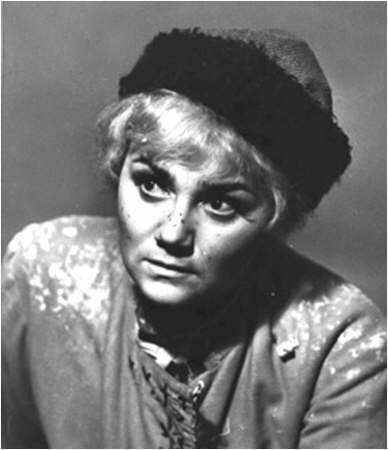Tamara Sinjavskaja
born 6 July 1943 Moscow
 |
| Sinjavskaja as Vanja |
Originally, the fourth act of Glinka's Zhizn za tsarja opened with the great tenor aria Bratsy v metel.
Later, Glinka wrote an additional aria for the trouser role Vanja: Bednyj kon v pole pal (My poor horse fell in the
field), as a new second scene of act 4. So in the oldest scores of the opera, you'll only find the tenor aria; later on, both
scenes were performed. But when the Soviets reworked Zhizn za tsarja to Ivan Susanin (they wouldn't have
sacrificed "A life for the tsar"), they cut the tenor aria out, and made Bednyj kon v pole pal the first scene of act
4.
Sinjavskaja spent her entire operatic career (1964–2002) at the Bolshoj. She was at least as active on the concert
podium as on the operatic stage, and not least one of the foremost interpreters of Soviet (propaganda and other) songs. For
her unusually low and dark contralto voice, the tessitura of most operatic roles is a bit high, nonetheless she managed to
sing a lot of mezzosoprano parts, even Carmen. But where she really shines is in songs that she can transpose so as to fit
her voice, and so as to display her stunning low register that she simply never needs in opera.
She was deeply connected to the Soviet Union, and was even a deputee of the Supreme USSR Soviet from 1984; also, the Soviets
named a dwarf planet located between Mars and Jupiter after her (it's still called "4981 Sinyavskaya"). She was married to
another larger-than-life Soviet star, Muslim Magomaev.
For the aria, cf. also Zaremba.
Reference; picture source
I cannot refrain from adding my favorite Sinjavskaja rendition of a Soviet song: an appearance on Russian TV (rather
poorly recorded, unfortunately) in 2006, on April 12th – which is "Cosmonautics Day" in Russia, an official holiday.
The song is about space flight, accordingly, and the title means "This is Earth". |
